Key takeaways:
- Film festivals offer valuable networking opportunities, fostering connections that can lead to collaborations and innovative projects.
- They serve as platforms for dialogue and critique, enhancing filmmakers’ understanding of storytelling through audience engagement and feedback.
- Festivals support emerging talents and create a sense of community among diverse filmmakers and audiences, enriching the cinematic experience.
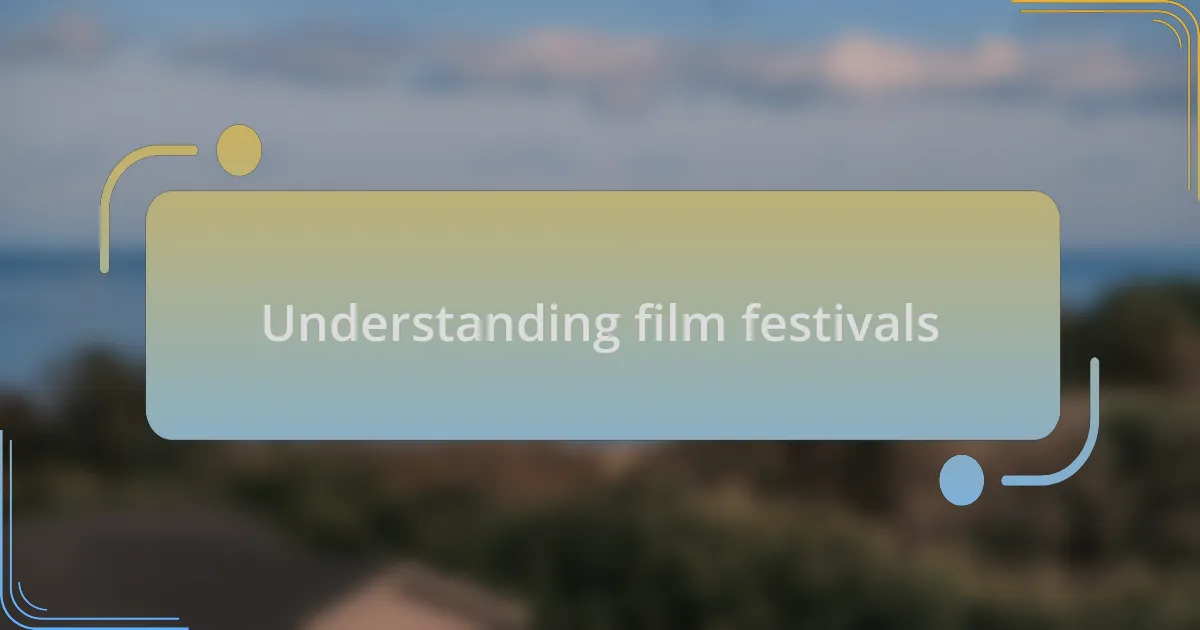
Understanding film festivals
Film festivals are unique cultural events that showcase a diverse array of films, from independent gems to blockbuster premieres. I remember my first film festival experience; the atmosphere was electric, filled with anticipation and a palpable passion for storytelling. It made me wonder, how often do we get to connect with fellow cinephiles in such a spirited environment?
Attending a film festival opens up a world of networking opportunities. I distinctly recall striking up a conversation with a director who had just screened his feature. His genuine excitement about his work inspired me to reflect on my own creative pursuits. Does that kind of interaction not spark new ideas and collaborations in ways we often overlook?
Moreover, film festivals function not only as screening venues but also as platforms for dialogue and critique. I found that engaging in discussions about films can deepen your understanding of the art form. Have you ever left a screening with more questions than answers? I certainly have, and those moments have profoundly shaped my perspective, encouraging me to explore various filmmaking techniques and narratives.

Importance of film festivals
Film festivals play a vital role in fostering creativity and innovation in filmmaking. I vividly remember attending a festival where a short film about environmental issues sparked a heated debate among the audience. That moment made me realize how powerful storytelling can be in driving social change and inspiring filmmakers to tackle important topics. Have you ever witnessed a film change someone’s perspective? It’s fascinating how film can influence emotions and thoughts on critical issues.
Moreover, these festivals often serve as a launchpad for emerging talents. I once met a budding filmmaker whose debut feature was being showcased. His nervous excitement was palpable, and I couldn’t help but admire his bravery. That day, I learned that countless filmmakers take significant risks to share their vision, and festivals provide the vital exposure they need. Isn’t it amazing to think that a festival could be the very beginning of someone’s career?
Another significant aspect of film festivals is the sense of community they cultivate. I recall walking through a festival’s bustling hallways, where I connected with people from various backgrounds, all united by a love for cinema. It’s this shared passion that makes the experience so enriching. How often can we gather with others who appreciate the art form as deeply? The enthusiasm and inspiration that permeate the air during these events create a lasting bond, reminding us of the universal language of storytelling.
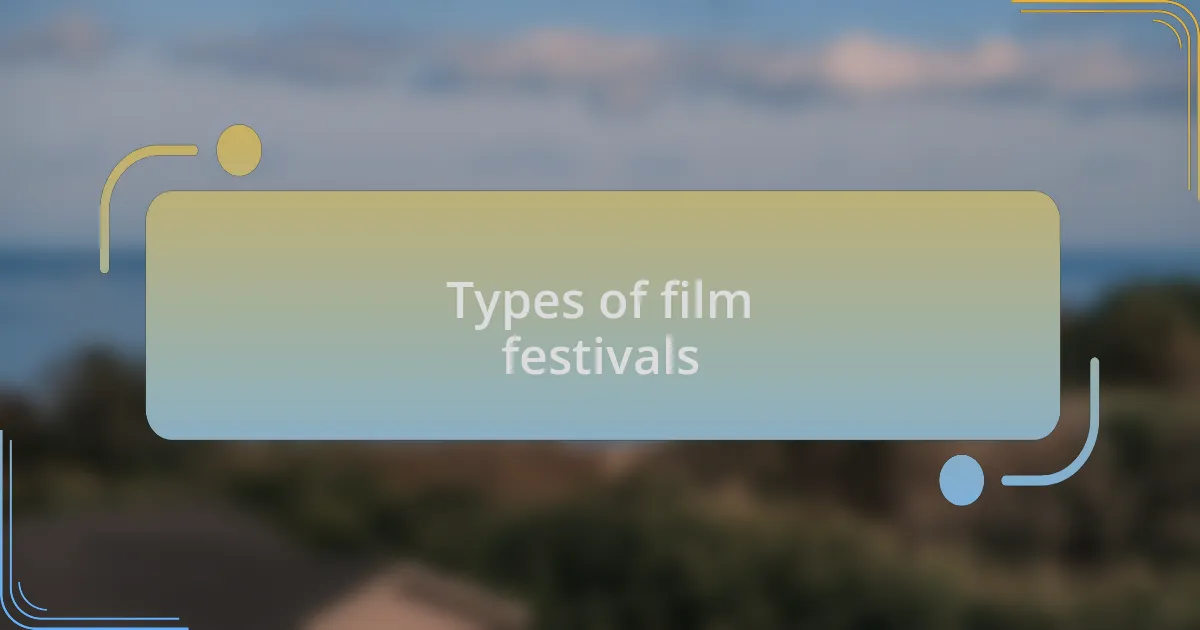
Types of film festivals
Film festivals can be categorized into several types, each with its distinct focus and purpose. For instance, genre-specific festivals, like horror or documentary festivals, attract niche audiences and filmmakers. I remember attending a horror festival where every screening left me breathless, not just from the scares, but from the creativity that filmmakers displayed in tackling fears and human emotions. It’s incredible how these specialized platforms allow certain storytelling styles to shine.
Another type is multicultural or international festivals that emphasize diversity in cinema. I recall the excitement of watching films from countries I had never even considered exploring. These festivals celebrate cultural stories that connect people across the globe, enriching my understanding of different societies. Have you ever experienced a film that introduced you to a culture you were unaware of? It’s magical how stories can bridge divides and foster appreciation for our differences.
Then there are student and emerging filmmaker festivals dedicated to showcasing fresh talent. I attended one where I was moved by a student’s documentary about growing up in an underserved community. Seeing aspiring filmmakers share their deeply personal stories reminded me of the raw passion that drives many to pursue this craft. Isn’t it inspiring to witness the next generation of storytellers take their first steps on this journey? The energy at these events is palpable, filled with hope and potential, making them truly special.
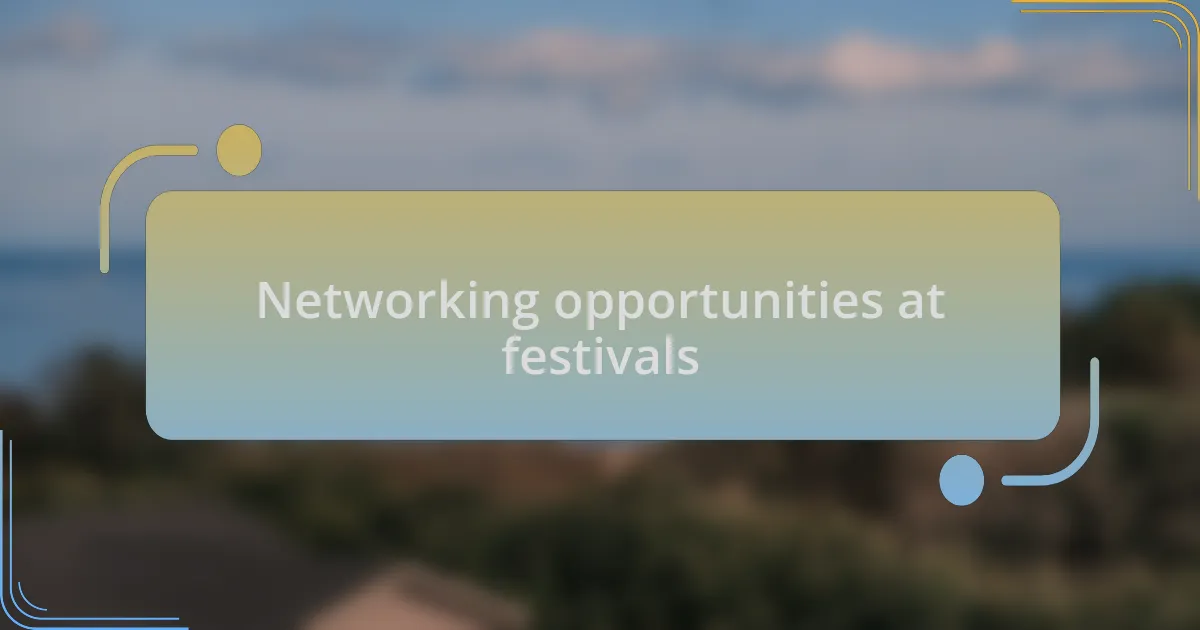
Networking opportunities at festivals
Networking at film festivals is an exhilarating experience that opens doors to new relationships and collaborations. I’ve had moments where a simple conversation led to a creative partnership that drastically altered the course of a project. Have you ever struck up a dialogue with someone over a shared love of cinema? It often happens in the casual atmosphere of a festival, where everyone is eager to connect and discuss their work.
Being surrounded by like-minded individuals can spark inspiration and lead to unexpected opportunities. I vividly recall meeting a cinematographer during a panel discussion who shared invaluable insights into the industry. Our brief chat turned into a brainstorming session that not only enriched my perspective but also resulted in a collaborative short film. Can you imagine the possibilities that arise when you’re in a room filled with people passionate about storytelling?
Moreover, the informal networking events, like mixers and Q&A sessions, are essential. They provide relaxed environments where filmmakers can share their journeys and lessons learned. I once attended a networking dinner and ended up sitting next to a seasoned director whose career I’ve admired for years. Sharing experiences with someone whose work I respect was not only inspiring but also a reminder of the importance of both learning from and supporting one another in this ever-evolving film landscape. Have you ever left a festival feeling more connected than when you arrived? That’s the power of networking.
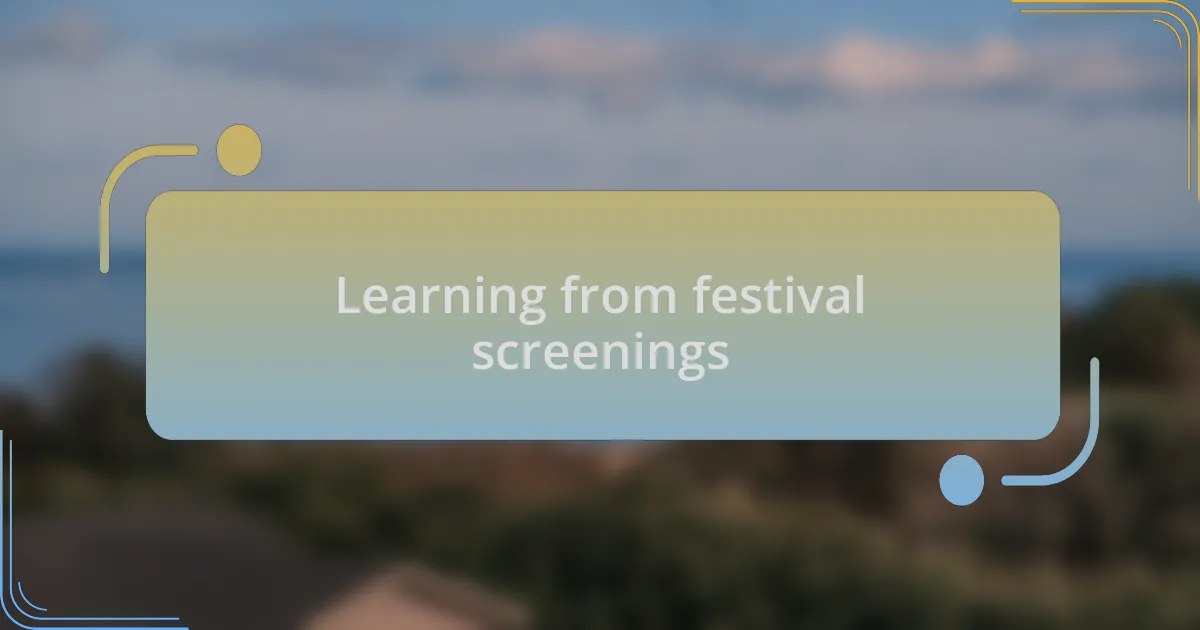
Learning from festival screenings
Learning from festival screenings can be an eye-opening experience. I recall one particular screening where I was captivated by a film’s unique narrative structure. Afterward, during the discussion, I realized that what I initially saw as a creative risk was actually a clever storytelling choice that resonated deeply with audiences. Have you ever watched a film that made you reconsider your own approach to storytelling? It’s in those moments that I’ve recognized the potential to evolve as a filmmaker.
During another festival, I attended a screening that featured an indie film with an incredibly limited budget. What struck me most wasn’t just the film’s raw emotion, but how the filmmakers utilized their constraints to enhance their narrative. This taught me that creativity often thrives under limitations. Have you ever experienced a project that challenged you to think outside the box? It’s these kinds of screenings that push me to question how I can leverage my own resources to tell compelling stories.
Listening to audience reactions in real time during screenings is also invaluable. I vividly remember a Q&A where viewers expressed their interpretations of a complex character; it made me realize how diverse perspectives can enrich the understanding of a film. Can you think of a time where feedback shifted your perception of your own work? Engaging with audiences after screenings not only offers insights, but it also creates a dialogue that fuels our growth as filmmakers.
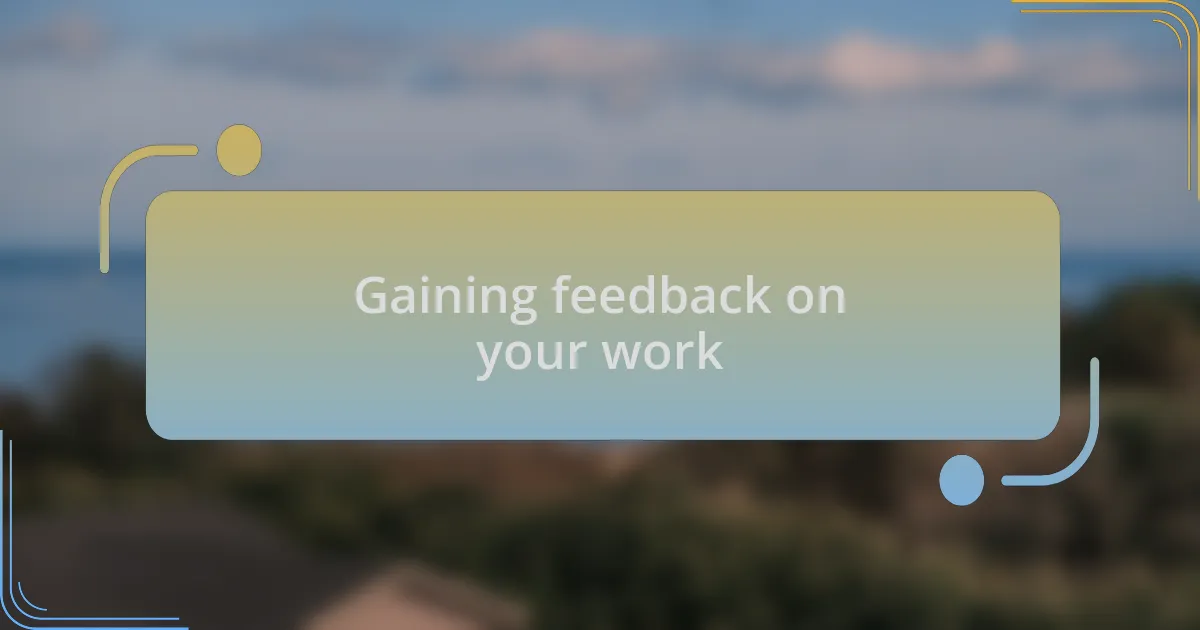
Gaining feedback on your work
Gaining feedback on your work can sometimes feel daunting, but I believe that embracing this vulnerability can lead to tremendous growth. I once showed a short film at a local festival, and while I was proud of the final product, I found myself anxiously awaiting the audience’s reaction. A filmmaker approached me afterward, offering constructive criticism that highlighted aspects I never considered, like pacing and emotional depth. Has there been a moment in your journey where criticism unexpectedly opened your eyes?
One particular feedback session stands out for me; a mentor pointed out the significance of sound design in my film. Hearing that made me realize how integral sound is to storytelling, often overshadowed by visuals. I remember feeling a mix of embarrassment and gratitude—how had I overlooked such an essential component? This experience taught me that feedback shouldn’t just be seen as an evaluation but as a source of inspiration that can illuminate paths I hadn’t explored.
Sometimes, I find it helpful to collect feedback through informal screenings with friends or fellow filmmakers. During one such gathering, I discovered that a subplot I thought was clear was actually confusing to viewers. Their questions revealed gaps in storytelling I hadn’t noticed before. Do you share your work for feedback in these settings? This approach not only builds community but also fosters a safe space for candid critiques that can significantly enhance your project.
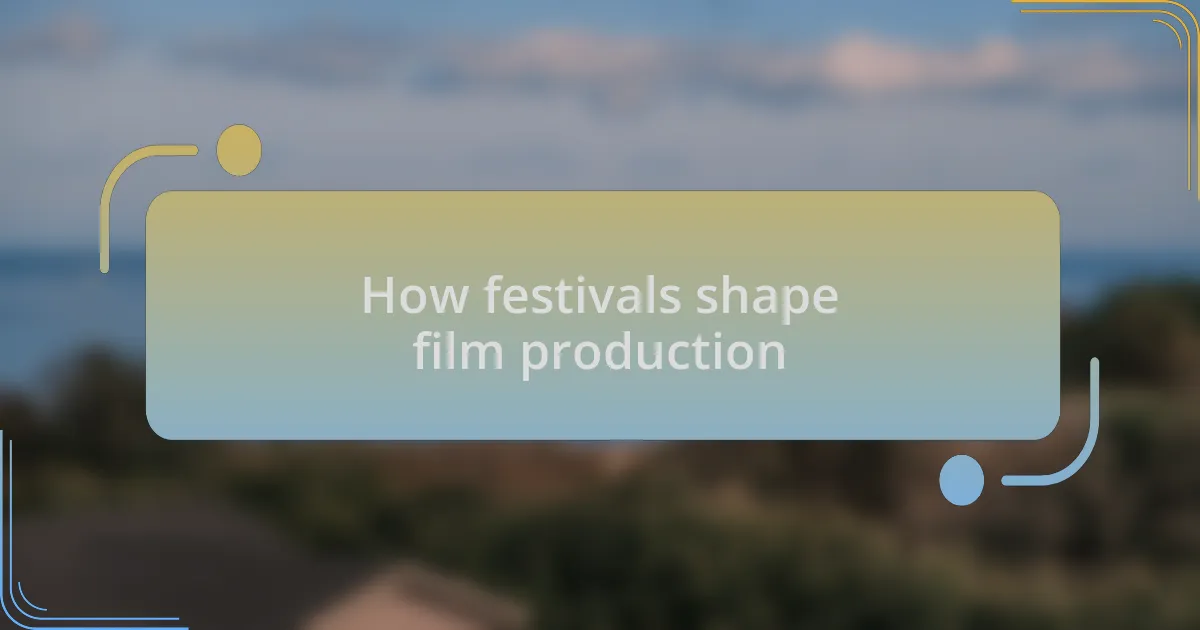
How festivals shape film production
Film festivals wield significant influence, often setting the tone for what audiences desire. When I attended a prominent festival, I was struck by how the atmosphere not only celebrated films but shaped industry trends. It was fascinating to see films that initially seemed niche gaining traction simply because they connected with festival-goers. Have you ever thought about how the festival circuit can create buzz for a project before it even hits mainstream distribution?
Aside from spotlighting potential hits, festivals also act as incubators for innovation in film production. I remember speaking with a director who had premiered a bold, experimental short film at a festival. Their willingness to push boundaries inspired others and created conversations about new techniques in storytelling. This experience truly affirmed my belief that festivals offer a fertile ground for filmmakers to test unconventional ideas, which can lead to breakthroughs in the craft.
Moreover, the networking opportunities at these events can’t be overstated; personal connections often lead to fruitful collaborations. At one festival, I had an impromptu chat with a producer over coffee, and we ended up developing a project together. It made me realize just how pivotal these gatherings can be in forging partnerships that might redefine a filmmaker’s career. When was the last time a casual encounter sparked a revolutionary idea for you?